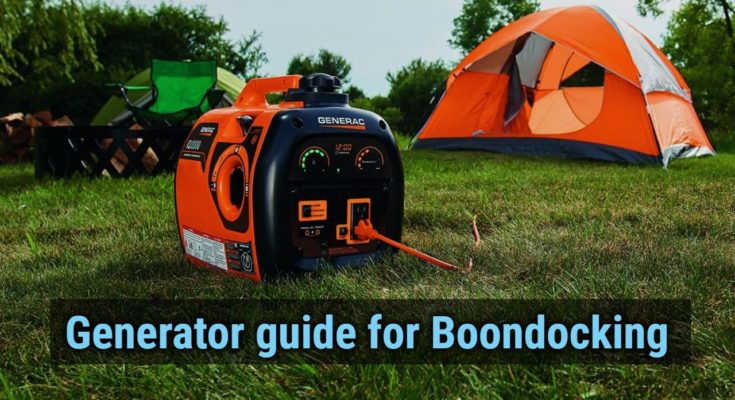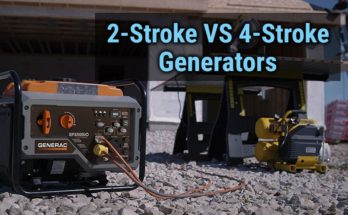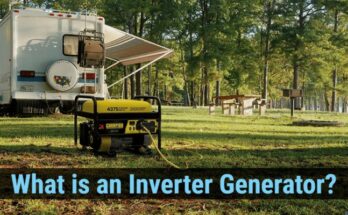A boondocking is a way of life for some, and for some, it is an escape from their hectic life. Overall, boondocking is a great experience to have once in a while. Boondocking means camping in the lesser-known areas where there is no availability of food or water or electricity.
But, a boondocking can turn out to be a nightmare rather than a heavenly experience if you are not properly prepared. There are many things that you need to ensure before you go on a trip, and if you are a rookie in the field, then it becomes even more important for you. If you have been on a few trips or an experienced person, we are sure that you will learn something from here.
We have discussed so many things. What you should bring during the camping, what you can bring as a power source, and how to use a generator if you decide on that one. We have also explained the lands where you can boondock.
Let’s start with the explanation of boondocking.
Table of Contents
What is Boondocking?
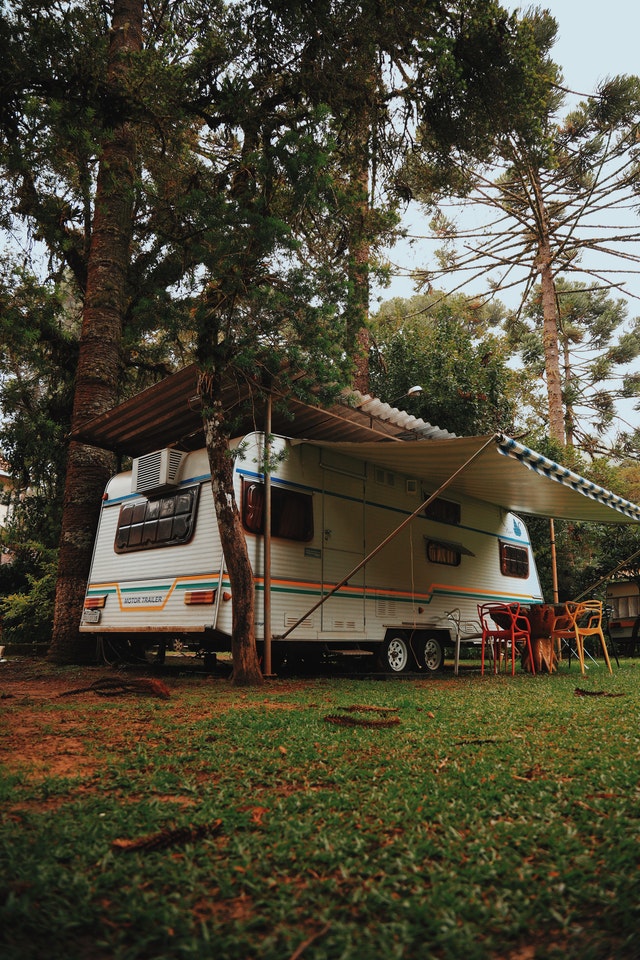
The name Boondocking comes from the word ‘ Boonies. ‘ It refers to the places away from the big cities, like small towns and cities. In general, boondocking means camping in a place where there is no availability of electricity, sewage, or water other than what you bring along with you. That’s why it is also known as free camping or primitive camping, or, in the official term, dispersed camping.
It is a type of camping where you pull off the road and camp at any free place, and it has the advantage that there won’t be any annoying neighbors around. You will be alone in the wilderness and can enjoy the view and the fresh air of nature peacefully. Boondocking can be done anywhere, but for most people, it means they stay in the forest or the BLM land, the land owned by the bureau of land management.
It is free, but if you plan to go camping on private land, then it will cost you a few bucks. To stay during your free camping, you can have a van, a car, or an RV. If you are going on the boondocking for the first time, then it is natural if you find some inconvenience, next time you won’t face the same difficulties as you learn from your mistakes.
Boondocking is generally avoided in extreme weather as you don’t have access to electricity or any other amenities; such as in summer, you won’t have enough electricity to keep running your air conditioning unit.
Boondocking is a great way of escape, and you should do it once in a lifetime, if not more. But where can you boondock? We have covered that in the next section.
Where to Boondock?
If you have decided to boondock, then you can either pick private lands, a forest, or public land. But, before you choose a spot, make sure that you are complying with all the regulations and it is not illegal to camp on that site. Most of the campsites will be free, but you can’t just camp anywhere you like.
Once you choose the site to find a spot that has a moderate temperature, and when it starts getting hot, you can find the shade to camp. There is an abundance of public land where you can do free camping, but some of them will have the capability to place you in the middle of nowhere, so be mindful where you camp.
You can go to the most boondocking people’s favorite spots, which are land managed by the BLM and public lands. The reason is that they are free of cost and are maintained well for campers. When camping in BLM or public lands, be sure to have all the essentials with you.
An interesting site to camp can be a wildlife management area as they sometimes give thumbs up to the boondocking people, but with strict rules and regulations. These rules will be considerably different depending on the site. It will be a very good experience if you find a spot here. Moreover, national parks are also great for primitive camping as they too few times allow the free campers to camp within the park.
Another place you can choose is the national forest or state forest. A national forest lets you do primitive or dispersed camping. You can easily find the national forests on the map. While state forests also offer free camping but, you will need to obtain a permit. It can be easily achieved for free of cost or with a very minimal cost.
Is Boondocking Legal?
Boondocking is legal, and it is something that the government encourages people to go on boondocking experience. As in the vacation period, most of the people would like to spend their time in nature, and so most of the campgrounds get overcrowded.
To somewhat tackle the overcrowded camps boondocking is promoted. But it doesn’t mean that you can do as you like. Before camping on any site in the area, get yourself familiar with the rules and regulations associated with free camping. As sometimes it can save you from big trouble.
When you drive your vehicle off the road, you should be on the road which is already there, and it isn’t allowed to make your own roads by cutting trees or destroying small plants. This is a common rule for most campgrounds. If there are dirt roads or truck trails, then you can drive on them, that is ok.
Ensuring Your Electricity Needs
When you are in no man’s land, it is obvious that you won’t have access to electricity, but to run your appliances, electricity is essential. So to fulfill electrical needs, you will need generators or other power sources.
Generators
Generators are a great way to ensure that all your power needs will be taken care of. They supply stable power and come with a large output power capacity, which will be enough to run a Microwave or an Air Conditioning system.
Generators are most commonly used as a power source during camping, and many of the vehicles have a built-in generator on them. But, if yours don’t, then you might need to invest in one.
Fuel to them is provided from the existing fuel tank on the RV, and if you are not bringing an RV, then you will have to bring the fuel along. Whether you have a gasoline or diesel rig, the generator will pull the fuel from the rig for its operation.
Moreover, they come with a failsafe, which will shut down the generator as soon as the fuel level drops below a certain limit. It makes sure that you don’t stay without fuel, stranded on the vast land where no one is to be seen as far as the sight reaches.
They might supply stable power, but they are not good for the environment, and for some campsites, they may not be allowed. Gasoline or diesel generates the toxic fumes loaded with the deadly CO, so keep your windows and doors closed when the generator is running to prevent the accumulation inside the vehicle.
Still, they are an economical option. But, there is another way, instead of conventional generators, you can bring the inverter generators, which can run on propane. They are small, and lightweight creates very little sound, and don’t spread out toxic fumes.
Solar Panels, Batteries, and Inverters
A second way to get the power you need is the use of batteries, and there are two types of batteries: standard batteries and heavy-duty deep cycle batteries.
The difference is that the deep cycle batteries can power your laptops, tv, a fridge and is enough to prepare dinner through an inverter. It delivers steady power to the appliances. While the standard batteries are designed to provide larger power bursts, this means they can start and run a few heavy appliances.
Still, standard batteries are not recommended at all, and this high power use will drain them quickly and reduce their lifetime considerably. The batteries can be recharged with the engine or generator or with solar panels.
But the most economical and environmentally friendly option is the use of solar panels. They fit on the roof of your vehicle and extract energy from the sun’s rays. To recharge the battery, panels shouldn’t be in the shade and should have enough sunlight. Note that solar panels are costly, and you can not take them off to power other appliances in your house.
Boondocking Tips
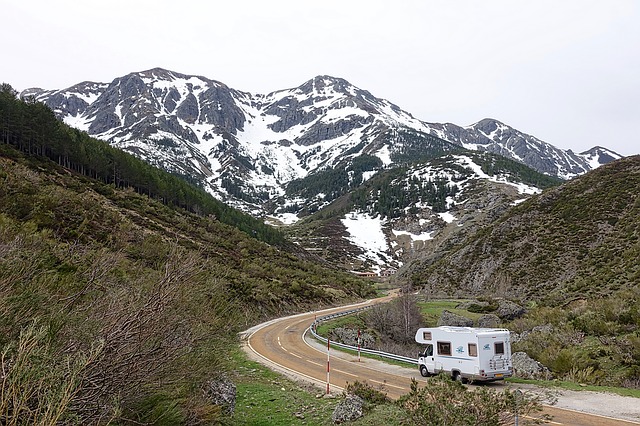
Once you decide to go on a boondocking trip, then you should follow rules and regulations of the site and be mindful of a few things to have a smooth camping experience. We have shared some tips which will help you and provide a good free camp experience.
- The first thing to ensure is that you are bringing enough water with you, as water won’t be available on free campsites. All water you will have is the one which you bring along.
During your stay, you should ensure that no water is unnecessarily wasted. You can reuse the water from your daily activities for some other purposes. To save some more water, you can bring along the composting toilet, and it won’t need any water. - Before you head out, make sure that the site you chose, you can camp there. You can’t just camp anywhere you like. Also, maintain the proper etiquette. If you have neighbors, then you should be quiet at night. You don’t want to disturb their sleep with noise.
- As mentioned, you can’t camp anywhere. It might put you in trouble if you camp where it is prohibited. So, you should ask the ranger, or if the land comes under the BLM, then you can enquire at their office. They will provide you the spots where you can camp.
- Before departing from your home, make sure that you know what your power needs are and have a proper means to fulfill them. If you know your power needs, then you can decide whether you need to bring fewer solar panels or more. You can decide the size of the battery or generator.
- Another thing is that you can go on boondocking with a larger RV or smaller RV or in a camping vehicle. The larger RVs might not fit in some compact places, but you can park them somewhere else.
- If you bring the larger RV, then it will save from much trouble if someone goes first and inspects the camping spot in smaller vehicles. If you directly enter with your RV and it doesn’t fit, then you have a problem.
- When you are leaving, it is your responsibility that you leave the place cleaner than you found. To keep it clean, you will have to bring along the trash, and after some time, you will accumulate enough that it will start bothering you. The solution is simple, and you can avoid the disposable dishes and the items which are individually packed, and also take out your food from the packaging before you leave.
- Also check the weather forecast, whether the sky will be sunny or there will be rain, which can affect your camping plan. Make sure that all of your electronics are fully charged, and take extra supplies in case you need it.
Generator Use Guidelines
A solar generator is an eco-friendly option to satisfy your power needs during your boondocking trip, but not all individuals will prefer it. Someone might want to take a generator with them for its easy operations and constant power. So, if you decide to bring along the generator, then to ensure the proper working and to ensure the smooth operation of the generator, you can follow these guidelines.
Inspect The Generator Before You Leave
The first thing to do is to make sure that the generator is in good condition, if you haven’t used it for a year then it will need a proper service. You should do a full inspection of all the parts of the generator to make sure that it will work as you intend it to be.
You can check oil levels; if oil is low, then refill it. Also, check if the spark plug is properly working, check the fuel pipes, check the filters if they need to be replaced. There are still few more things, check the functionality of the battery, engine, electrical wirings, and carburetor. If you find any issues, then solve them.
After confirming that everything is how it should be, start the generator and let it run for half an hour to a full hour without any load. After that, run it on the load to see if it’s properly working; if there will be any issues, then this is where it will become apparent.
Now, everything is done; your generator is working fine, but generators are noisy, and to keep the sound as minimum as possible, you should check the exhaust pipe and mufflers. Once it is done, you are all set to go. Just ensure that you have more than enough fuel to get you through at least 4 days.
You can install the generator box on the RV so you can easily take it out and put it back.
Using a Generator On a Camp Site
When you are on a campsite, you should never leave your generator unsupervised when it is running. It should be placed under a shed, and the generator gets heated when it runs. If it is put under the sun in the open, then the temperature will skyrocket, which will damage the parts and components. Also, use the safety tent when the weather is not so good.
When running a generator, don’t mount it with too much load, don’t overload it. Also, it shouldn’t run for more than 7 to 8 hours continuously, it gets heated, and the quality of the parts deteriorates.
A generator should not be near to your place of sitting; keep it away to reduce the interference due to the noise generated. The recommended distance between you and the generator is 10 to 15 meters. Also, take some measures to reduce the noise. Even if the generator is away from you, it still generates noise that can disturb the wildlife and your neighbors.
Moreover, when the generator runs out of fuel, let it cool down before you refuel it, and don’t even think about pouring in fuel while it’s running. When you don’t need power anymore, turn off the fuel to the carburetor and let the generator run for a short time so that the fuel in the system gets used up and doesn’t create any issues.
What to Do When You Are Home
Once you are back home from the trip, inspect the overall condition of the unit, fix anything if there is a need, empty the fuel tank and carburetor, and then you can store it after wrapping it in a proper cover.
Safety Concerns While Boondocking
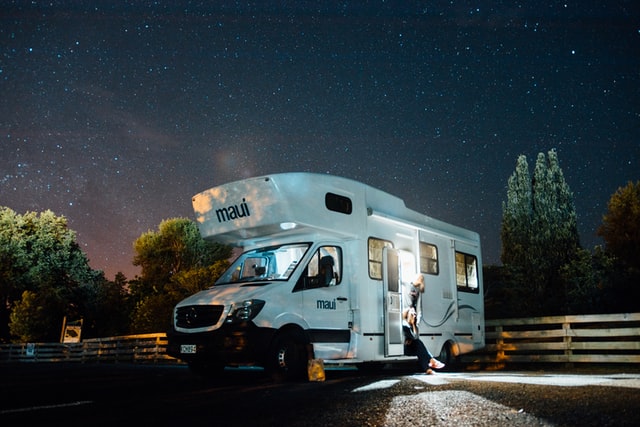
Boondocking is a fun activity, and it is like a breath of fresh air. But, when you are at an unknown site in the middle of nowhere, you must be concerned about safety and be also prepared if emergencies arise. We have listed down the safety tips down below. Following them actively will keep you out of trouble, and you will have a comfortable experience.
- First, you are camping in a wilderness, home to wild animals, so you don’t want to unnecessarily be the center of their attention. Many animals are harmless, but some are not; you want to be safe from them. To avoid any kind of attention, make sure that you don’t leave the food in the open. Always keep it locked. And dispose of the remains of your food at a distance. Moreover, don’t try to disturb them in any way.
- Don’t be stressed out about your things while you go for a track and leave your motor home unattended. It is very unlikely that someone will steal anything from there. But still, to be one safe side, don’t flash your expensive items outside. Keep them inside and lock the door.
- Another important thing to bring along is the emergency kit. They will be a great help if you get a few scratches or a deep wound. An antiseptic and bandages can tend to your wounds and will keep the infections away. The emergency kit is not only limited to the medical supplies. You should also have a weather radio, compressors, gloves, thermometer, etc. Also, keep good quality flashlights with you.
- Same as the emergency kit, a way to communicate with the outer world, with your friends and family should exist. A cell phone is a good way to stay connected, but you never know when you will be out of coverage. So, you should know where the landline is located in your nearest vicinity. Also, know the location of the nearest gas station and the nearest hospital.
- Don’t go on a boondocking without informing anyone, you should inform your friends and family about your whereabouts, where you will camp and also about the route which you will follow. There is a slight probability that your trip might not turn out how you expected it to be. If something goes wrong, then they will know where to look.
- Electronic devices like GPS are reliable as long as they are charged. Your mobile device might go out of signal. So, you will not have access to your map. So, we advise that you always have a paper map with you. This way, you won’t drive off your route.
Moreover, you shouldn’t travel on the roads which look uncomfortable. There are high chances of your trailer getting stuck. - Before going on free camping, be sure to properly research the whole area, pinpoint all the nearest important places on the map. You shouldn’t feel like a trespasser on public land.
If you decide on a spot and your inner self signal that there is something off about the place, then you should listen to your guts. After all, your home is on wheels; you can choose another spot. - Before you leave for your destination, pack all the important things that you will need. Whether it is fuel, water, or food, make sure that you have them in plentiful quantity. Also, pack them in extra quantities than your needs. It is no fun to be stuck somewhere just because you ran out of fuel. Other than that, keep a few tools handy. When something goes wrong or malfunctions, you can fix it yourself.
Final Thoughts
As we said, if you have a comfortable experience, then boondocking is a very good escape. Most public sites will be free to camp, and it will be an adventurous experience. But to make it comfortable, you should follow all the tips we have given here.

